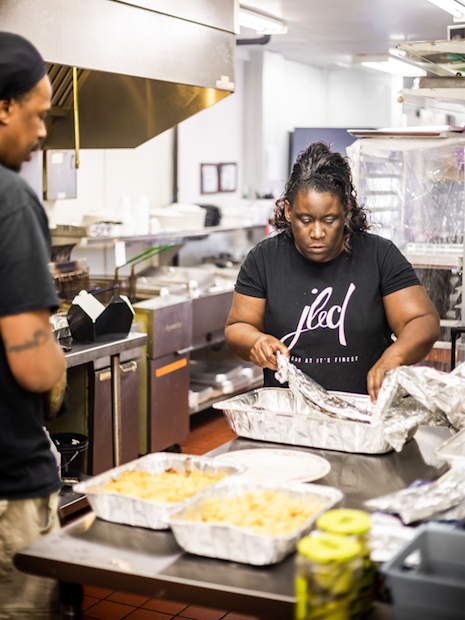If times of hardship reveal the character of a person, then Jeanetha Brown-Douglas is a testament to kindness and charity. In the middle of the pandemic, facing a slowdown in her own business, the owner of JBD Event Catering & Soul Food teamed up with her family to feed community members in need.
Brown-Douglas, her daughter Dejua, and sister Ruth Turner created Free Meal Friday to provide gratis meals and desserts once a week at JBD’s new location in the former Wild Wolf Brewery spot at 313 Second St.
“When COVID hit, we had to shut down for months, and we had to find a space that was able to conform with all of the safety guidelines,” says Brown-Douglas. “We were fortunate to find that in our new location, our space is large enough for social distancing and also has a large patio for outside dining.”
This setup also allowed her to invite those who needed a hot meal to come in from the cold to eat, or grab some food to take away.
“The idea for Free Meal Friday was born out of the love for our community,” says Brown-Douglas, who had been delivering meals to the Salvation Army and UVA students in the early months of the pandemic through St. Paul’s church. When that stopped, she joined forces with Dejua and Turner, whose business, Hands of Favor, creates customized wigs and provides hair therapy for people in need. “We decided to continue feeding and protecting the community. We also offer masks and hand sanitizer for everyone who comes in to get our free meals.”
Since starting Free Meal Friday, the team has averaged 25 meals per event. Brown-Douglas says food options include baked spaghetti, cheesy mac, and sandwiches. She pairs these with desserts made by her daughter and a bottle of water.
As word got out, others have come forward to help make Free Meal Friday happen. “I am so thankful for the heartfelt donations that have been offered to our cause,” says Brown-Douglas.
She says they’re planning to continue the program at least until the end of March. “Hopefully we will be in a better place with the pandemic, but if not, we will continue offering our help to the community.”
As for her business, which Brown-Douglas says is a “concept of restaurant-event space and catering combined” it’s getting by. “Though business is up and down, we still manage to do okay,” she says.
“We have our regulars that stay with us, which is a blessing. We currently offer indoor dining and takeout.
And we’ll offer small events as the governor allows.”
JBD Event Catering & Soul Food is open 12:30-8pm every day but Monday and Wednesday. The donated meals are available at its storefront on Fridays from 2-4pm, with extended hours as needed. Brown-Douglas welcomes donations to defray the cost of the meals. Checks made out to JBD Event Catering can be dropped off at the restaurant.










